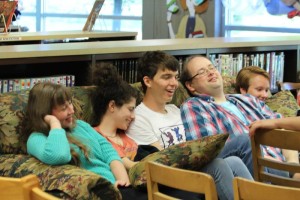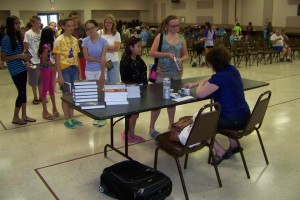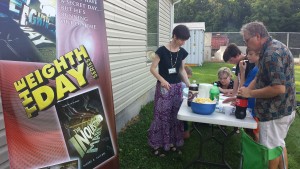Many Pennsylvanians have been disappointed to discover that our new Democratic governor, Tom Wolf, hasn’t turned out to be any better supporter of libraries than his much-despised predecessor, Republican Tom Corbett. Libraries aren’t even on Wolf’s radar and continue to be the loser when it comes to where PA tax dollars are spent.
I know that funding libraries is a problem across the country. But I think it’s particularly shameful in Pennsylvania. Benjamin Franklin founded the first public library in America in Philadelphia – a city where, currently, school budget cuts have reduced the number of certified librarian positions from 176 to 11 … for 218 schools.
Worse, some of the tax payers think this is just fine …
“Librarians are a relic of yesterday’s education models.” That was a comment on an article about the library crisis in Philadelphia schools. “Any student can access virtually all necessary information from their phone or computer. The only purpose of a librarian was to help you FIND information among the books. That’s no longer necessary.” Another commenter said that Philly schools needed to focus on teaching reading and math, not the Dewey Decimal System. These people seem to think that all librarians do is help kids “look stuff up” and find books on the shelves. They also see no connection between a working, thriving library and kids learning to read.
They have no idea what a community of readers looks like, nor do they understand that libraries — and librarians — are the foundation for creating one.
In my former school, the librarian (with the help of the PTA) budgets money for “Student Choice Books” every spring and invites students in grades 3-6 to recommend books to be added to the library collection. Not content with having students slap together a list of their favorites, this librarian supplies a set of criteria for choosing worthy books, requiring students to research new titles before submitting their proposed lists. Likewise, in Troy, Michigan, librarians at their four middle schools organize a massive reading program to award a Troybery – a mock Newbery – each year. (The Eighth Day was first runner up this past year.)
Many states take the Reader’s Choice Awards to the next level, with public libraries and school libraries collaborating to create a yearly list, make the selected titles available across the state, and promote the program with activities, author visits, and rewards for participation. The Caged Graves has been on such lists in Utah, Georgia, South Carolina, Vermont, and Alaska. The Eighth Day is currently on Florida’s Sunshine State Young Readers Award list.
Many libraries across the nation make use of the Collaborative Summer Library Program to entice kids to spend their summer reading. The 2015 theme: Every Hero Has a Story. I was invited to participate in several programs with tweens and teens this summer under that program. Thanks to the generosity of the Friends of the Henrietta Hankin Library in Chester County, PA, every teen who participated in their Summer Book Club received a copy of The Caged Graves to keep and was invited to attend a book club meeting led by the author. Likewise, the youth services librarian at the Dover Area Library in York County, PA wrangled a deal with Scholastic to get 100 copies of The Eighth Day into the hands of local middle school readers – and he shared a few with the neighboring Kreutz Creek Library for their Under the Floor Book Club.
The little town of Brookville, PA also has a thriving library with an active community of readers and benefactors. This year was the fifth summer they brought in a YA author for an afternoon teen program and an evening adult program, generously putting up the author in a local B&B and providing dinner at a local restaurant between events. My dinner was attended not only by the librarians, but also by teen volunteer workers and members of the local writing group. Because of the subject matter of The Caged Graves and We Hear the Dead, my evening talk also drew in members of the local historical society.
So, for politicians and anonymous internet commenters who believe that librarians are dinosaurs of the past who can no longer compete with Google and smart phones and iPads … I ask you: When’s the last time you met one?



You’re right. Librarians do foster a love of reading, if they’re passionate about their jobs and they have enough resources at their disposal.
Who would set up all those programs if there weren’t librarians? No one. And that would be a shame.
Wish there was an easy way to suggest books. Mine would fit well in a high school library.
Amen!!
It’s incredibly short-sighted for a community, or a state, whatever, to underfund libraries. The sad truth is some children grow up in homes that have NO BOOKS and whose parents place no importance whatsoever on reading. How else will those children learn to love reading if they don’t have access to books, and the encouragement librarians provide? And for reading addicts like me, libraries have always expanded the possibilities of new things to read, new things to learn.
I just read somewhere recently a quote attributed to Winston Churchhill in reference to libraries. When it was suggested that they be denied money in order to better fund the war fun, he said, “What, then, are we fighting for?” (or words to that effect.)
Hmmm, come to think of it, maybe I read that because YOU posted it on Facebook… 🙂
What can you say when confronted with comments like that about libraries? I guess what you’ve said. Our library is a hub of activities for all ages, and it’s so much more than clicking on a device to pull up something. It’s about connecting with others and enjoying the company of readers. It’s about seeing the products of so many brilliant and interesting minds as you stroll the aisles. It’s about creating the desire to enter other worlds and discover how other people view those worlds.
How unsurprising. Libraries don’t make money, so no one cares about them. Try to get them to believe that that resource there is important and they won’t listen to a word you say.
I am shocked. SO sad to read about the cuts…. unbelievable. THANKFULLY there are some who still care and these amazing programs still exist…but for how long?
SO happy to hear your novels are so well loved and appreciated Dianne… You know you are one of my favorite authors!
That is too bad, because libraries are wonderful places for kids to grow up. I have fond memories of going to so many activities at the library. One, b/c they were free, and my single mother could afford that, and two, b/c they were always so much fun! And without our public library, there would have been so SO many books I would have missed out on, as we couldn’t afford to buy tons of books. Eventually we could, once we got into a better economic place, but that wasn’t until we were in our teens. And by then, my love of reading could have shriveled up and died a sad and lonely death. =(
Oh, and I forgot to say that I love that TED themed bbq! So inventive! And I love food so… =)
Hi Dianne … interesting read about libraries and how they help you, yet the powers that be hinder you. It’s an area I’d love to know more about .. I think perhaps I should have been a librarian .. but at stage of my life – it certainly wasn’t on the cards.
I visited our second city’s new library in Birmingham (UK) … that is being completely undermined – I’ll write about it … and people are being inventive about mini libraries in rural areas now …
Cheers Hilary
That image of the kids at youth services made me smile so big. I just love that. Librarians are way under-appreciated. I’m hoping to get more involved with our school and town libraries in the near future. It’s so important to keep connected in this way. I think it breaths a special kind of life into reading.
We moved specifically so I’d have access to a large library system with awesome resources. A community that doesn’t support their system, doesn’t deserve to have a system. (We kind of avoid public schools, so I can’t speak to their standards…)
This is really sad. I loved going to the library as a child. My daughter loves going too. As much as she loves computers and ereaders, she loves holding a book in her hand. And she adores her school librarian.
I still fondly remember walking down to the local library to grab some books. I wouldn’t mind seeing libraries continuing to flourish in today’s digital world.
The libraries here are fairly well-supported, which I’m incredibly grateful for. You make some excellent points about all the things librarians do and get little to no credit for from politicians and armchair Internet admirals. I’ve also found that people who think that “everything” they need to know is on the web have a shallow understanding of many subjects. When you really want a deep-dive on certain topics, books are still one of the best sources around.
I grew up in a university town with excellent public and campus libraries. I researched many a term paper in them. People are very wrong to think that “everything” is on the net. I desperately wish I had access to library materials when researching my novels ’cause there’s plenty of info I can’t find. But in a day and age where school lunches are being denied to kids, libraries (and the arts) are going to get the short end of the stick. 🙁
I remember my local library having a ridiculous amount of resources to help people not only find information, but find books that they’d like to read. I loved that. It’s ridiculous and disheartening to see librarians being treated like they don’t matter. -_-